
Russian post-punk echoes in Serbia
How members of Russia's alternative scene found a new beginning in Serbia.
|28.02.2023
|

Milica Joksimović
Milica Joksimović is a cultural worker and journalist. After studying biochemistry, she became involved in film distribution and the organization of film festivals. She also works as a freelance journalist.
This story was originally written in Serbian.